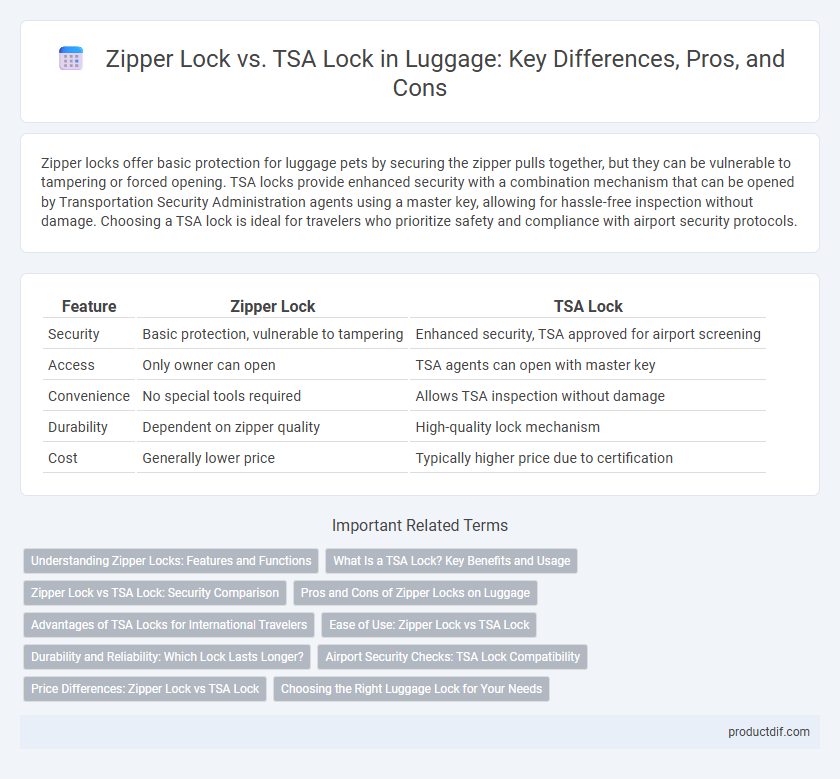Zipper locks offer basic protection for luggage pets by securing the zipper pulls together, but they can be vulnerable to tampering or forced opening. TSA locks provide enhanced security with a combination mechanism that can be opened by Transportation Security Administration agents using a master key, allowing for hassle-free inspection without damage. Choosing a TSA lock is ideal for travelers who prioritize safety and compliance with airport security protocols.
Table of Comparison
| Feature | Zipper Lock | TSA Lock |
|---|---|---|
| Security | Basic protection, vulnerable to tampering | Enhanced security, TSA approved for airport screening |
| Access | Only owner can open | TSA agents can open with master key |
| Convenience | No special tools required | Allows TSA inspection without damage |
| Durability | Dependent on zipper quality | High-quality lock mechanism |
| Cost | Generally lower price | Typically higher price due to certification |
Understanding Zipper Locks: Features and Functions
Zipper locks offer a basic security solution by securing the zipper pulls together, preventing easy access to the contents of luggage. These locks usually feature a combination or key mechanism but lack TSA approval, meaning they cannot be opened by airport security without damage during inspections. Understanding the limitations and functions of zipper locks helps travelers choose between convenience and security when selecting luggage protection.
What Is a TSA Lock? Key Benefits and Usage
A TSA lock is a luggage lock approved by the Transportation Security Administration that allows airport security officers to open and inspect bags without damaging the lock using a master key. Its key benefits include enhanced security during travel, compliance with airline regulations, and protection against theft while ensuring smooth security checks. Travelers use TSA locks to safeguard belongings while avoiding lock destruction or delays caused by forced entry during TSA inspections.
Zipper Lock vs TSA Lock: Security Comparison
Zipper locks offer basic security by preventing easy access to compartments but are vulnerable to tampering or forced entry, making them less reliable for high-value items. TSA locks provide enhanced security with a unique mechanism that allows Transportation Security Administration agents to open and re-lock luggage without damage using a master key, ensuring compliance with airport security regulations. When comparing zipper locks to TSA locks, TSA locks deliver superior protection and convenience during air travel, reducing the risk of theft and luggage damage.
Pros and Cons of Zipper Locks on Luggage
Zipper locks on luggage offer simplicity and flexibility, allowing easy access and repair in case of zipper damage without specialized tools. However, they provide limited security compared to TSA locks, as zipper mechanisms can be more vulnerable to tampering and forced entry. Zipper locks also may not comply with airport security standards, potentially leading to luggage being forcibly opened during inspections.
Advantages of TSA Locks for International Travelers
TSA locks offer international travelers enhanced security by allowing Transportation Security Administration agents to inspect luggage without damaging the lock, ensuring compliance with airport regulations. These locks feature a special universal key mechanism recognized by TSA, reducing the risk of forced entry during security checks. Choosing TSA-approved locks helps maintain luggage integrity while providing peace of mind during global travel.
Ease of Use: Zipper Lock vs TSA Lock
Zipper locks offer straightforward operation with simple slide or combination mechanisms, making them quick to fasten and unfasten. TSA locks provide enhanced security by allowing TSA agents to unlock bags without damage using a master key, but they may require familiarity with the combination or key system to operate efficiently. Travelers prioritizing convenience may prefer zipper locks for their simplicity, while those valuing security and regulatory compliance often choose TSA locks despite slightly more complex handling.
Durability and Reliability: Which Lock Lasts Longer?
Zipper locks typically offer less durability due to their exposure to wear and tear from frequent opening and closing, often leading to breakage or malfunction over time. TSA locks are engineered with robust materials and reinforced mechanisms designed to withstand rough handling and provide reliable security during air travel. Reliable TSA locks generally last longer because they meet stringent airline regulations and are built to endure repeated use without compromising functionality.
Airport Security Checks: TSA Lock Compatibility
TSA locks are specifically designed to be compatible with airport security protocols, allowing Transportation Security Administration agents to open and re-lock luggage without damaging the lock during inspections. Zipper locks, while offering basic security, often cannot be accessed by TSA agents without cutting the zipper or lock, increasing the risk of luggage damage. Choosing TSA-approved locks ensures hassle-free security checks and protects luggage integrity during airport screenings.
Price Differences: Zipper Lock vs TSA Lock
Zipper locks typically cost less than TSA locks, with prices ranging from $5 to $15, making them a budget-friendly option for basic security. TSA locks, priced between $15 and $40, offer enhanced security features approved by the Transportation Security Administration for airport inspections. The price difference reflects TSA locks' ability to be opened by security officers without damaging the lock, providing convenience for travelers at a higher cost.
Choosing the Right Luggage Lock for Your Needs
Choosing the right luggage lock depends on travel security and airport regulations. Zipper locks offer basic protection but may be easily bypassed by TSA agents without damage. TSA locks comply with Transportation Security Administration standards, allowing airport security to inspect luggage using master keys, ensuring your bag remains secure and intact during inspections.
Zipper lock vs TSA lock Infographic

 productdif.com
productdif.com